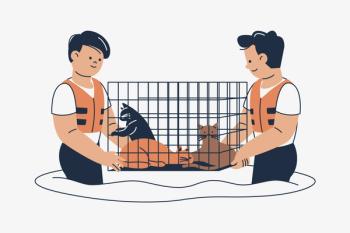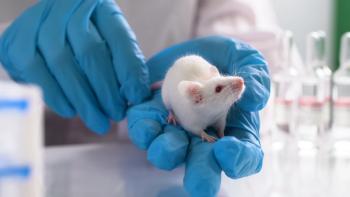
Helping hands: Florida vet aids homeless
With an SUV stuffed with medicine and food, Dr. Anne Scholl-Mealey pulls off an Orlando highway and stops at a clearing. She walks carefully through the sticky swamp and clouds of mosquitoes until she finds what she's looking for -- indigent animal owners.
Orlando, Fla.
-- With an SUV stuffed with medicine and food, Dr. Anne Scholl-Mealey, a companion-animal practice owner and mother of two, pulls off an Orlando highway and stops at a clearing. She walks carefully through the sticky swamp and clouds of mosquitoes until she finds what she’s looking for — indigent animal owners.
“It’s just amazing to watch all these people walk out of the woods into the clearing with their pets,” says Scholl-Mealey, who has been volunteering her time and skills to care for pets of the homeless around greater Orlando for the last five years.
“When you go out and you meet these people, they really are so grateful. I wish all my paying clients would show a little bit of thankfulness,” she says. “They really are grateful someone is coming out and helping them. They almost take better care of their pets than they do themselves.”
But Scholl-Mealey, 48, didn’t always have the same feelings about interacting with homeless people. She used to get extremely nervous about any interaction, even locking her car doors at stoplights. That’s because about five years ago during a late-night trip to a drug store to get cold medicine for her son, Scholl-Mealey had a confrontation with a homeless man and it shook her.
“It was really a crazy fluke thing, and I didn’t even notice him in the store until I kind of passed him and he grabbed me,” she recalls. “It was kind of scary. He wasn’t trying to hurt me, but he was in a drugged-out state.”
The man ran out of the store as employees came to Scholl-Mealey’s aid. He was later arrested, she said, but she declined to press charges.
“It kind of set me up for every time I was in my vehicle, I got nervous. My children started asking me why I was locking the doors at stoplights,” Mealy says.
Then, one day, she saw a homeless man walking along the street with his dog. “It hit me, ‘Oh my goodness, this doesn’t even bother you.’” That was when she started keeping dog food and supplies in her SUV, hoping to spot the man and offer him some help. “But I never saw that guy again.”
Shortly after that, Scholl-Mealey started going to areas where the homeless congregated, but says she never saw any pets.
A friend who helped feed the homeless told her they leave their pets in camps because they’re afraid they’ll be taken away in the city.
So Scholl-Mealey hooked up with a group called H.O.P.E. Team that sought out homeless in their swampy camps.
The first time she went to one of the camps, which usually houses six to 12 people and countless animals, she brought pet food and pharmaceuticals donated by drug companies. Five years later, she brings supplies she purchased and rarely sets out with H.O.P.E. Team just because it’s hard to coordinate schedules.
“I figure God has blessed me with so much, it’s not going to hurt me to go out and do this out of my own pocket,” she says. “I don’t do it because I feel an obligation. I just have so much fun doing it.”
The National Alliance to End Homelessness estimates Florida’s homeless population is about 25,000 to 65,000. The national estimate of homeless in 2007 was nearly 672,000, according to the group, which says the current economy is causing severe fluctutations in homeless populations, making it impossible for advocacy groups to keep accurate counts.
About half of the nation’s homeless are unsheltered, and Feeding Pets of the Homeless estimates up to 24 percent of homeless people keep pets. That means as many as 162,000 pets are on the streets with their owners — about 68,000 of which are unsheltered.
Some might think seeing the lifestyle of the homeless and their pets might be depressing, but Scholl-Mealey says it just makes her thankful for what she has. Besides, she adds, they all seem so happy to be right where they are.
“They’ve got to be the cream of the crop of the homeless. They’re not only trying to care for themselves, but also their pet,” she says. “The crazy thing is, these pets have the best lives. They’re outdoors with undivided attention and have the whole camp as a family. It’s never been depressing, and I’ve never walked out of the woods saying I feel so horrible for that pet.”
She follows up with her patients by meeting them at street corners and forest clearings, and even welcomes them to her office. She knows their stories and their names.
“The stories I could tell you if we had hours, oh my gosh,” Scholl-Mealey says, sounding as if she’s recalling a recent vacation. “I once treated a pig, dark red, that looked like it weighed 800 pounds. He looked like a small SUV. Who would have known in the woods in the middle of Orlando the homeless had this pet pig.”
And after practicing for 20 years and owning her own hospital, Chickasaw Trail Animal Hospital, Scholl-Mealey says she is still amazed by how much she loves her job and feels lucky she has a gift she can share with the less fortunate.“It just makes me thank God for the blessings I’ve got and having a roof over my head and air conditioning and all that stuff, she says.
Newsletter
From exam room tips to practice management insights, get trusted veterinary news delivered straight to your inbox—subscribe to dvm360.




